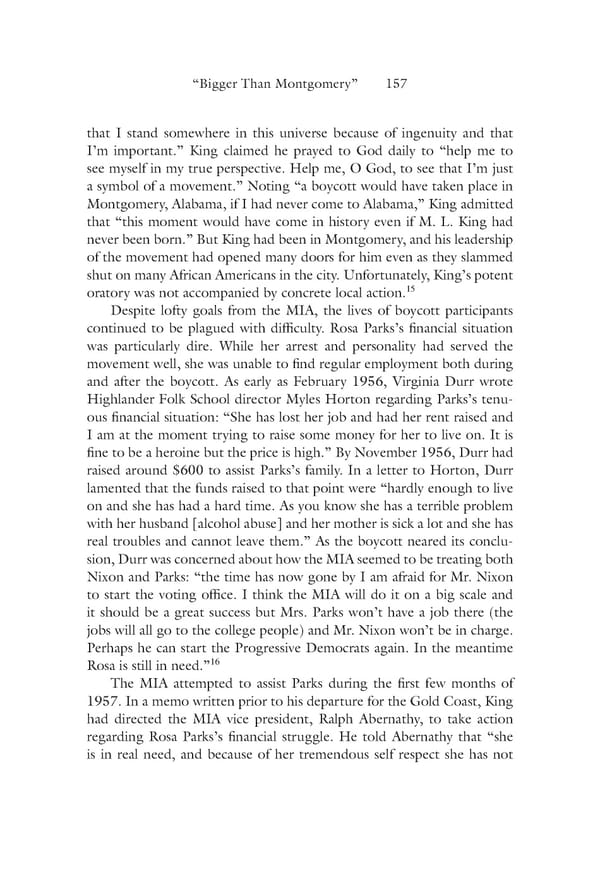“Bigger Than Montgomery” 157 that I stand somewhere in this universe because of ingenuity and that I’m important.” King claimed he prayed to God daily to “help me to see myself in my true perspective. Help me, O God, to see that I’m just a symbol of a movement.” Noting “a boycott would have taken place in Montgomery, Alabama, if I had never come to Alabama,” King admitted that “this moment would have come in history even if M. L. King had never been born.” But King had been in Montgomery, and his leadership of the movement had opened many doors for him even as they slammed shut on many African Americans in the city. Unfortunately, King’s potent 15 oratory was not accompanied by concrete local action. Despite lofty goals from the MIA, the lives of boycott participants continued to be plagued with difficulty. Rosa Parks’s financial situation was particularly dire. While her arrest and personality had served the movement well, she was unable to find regular employment both during and after the boycott. As early as February 1956, Virginia Durr wrote Highlander Folk School director Myles Horton regarding Parks’s tenu- ous financial situation: “She has lost her job and had her rent raised and I am at the moment trying to raise some money for her to live on. It is fine to be a heroine but the price is high.” By November 1956, Durr had raised around $600 to assist Parks’s family. In a letter to Horton, Durr lamented that the funds raised to that point were “hardly enough to live on and she has had a hard time. As you know she has a terrible problem with her husband [alcohol abuse] and her mother is sick a lot and she has real troubles and cannot leave them.” As the boycott neared its conclu- sion, Durr was concerned about how the MIA seemed to be treating both Nixon and Parks: “the time has now gone by I am afraid for Mr. Nixon to start the voting office. I think the MIA will do it on a big scale and it should be a great success but Mrs. Parks won’t have a job there (the jobs will all go to the college people) and Mr. Nixon won’t be in charge. Perhaps he can start the Progressive Democrats again. In the meantime 16 Rosa is still in need.” The MIA attempted to assist Parks during the first few months of 1957. In a memo written prior to his departure for the Gold Coast, King had directed the MIA vice president, Ralph Abernathy, to take action regarding Rosa Parks’s financial struggle. He told Abernathy that “she is in real need, and because of her tremendous self respect she has not
 Becoming King: Martin Luther King Jr. Page 177 Page 179
Becoming King: Martin Luther King Jr. Page 177 Page 179